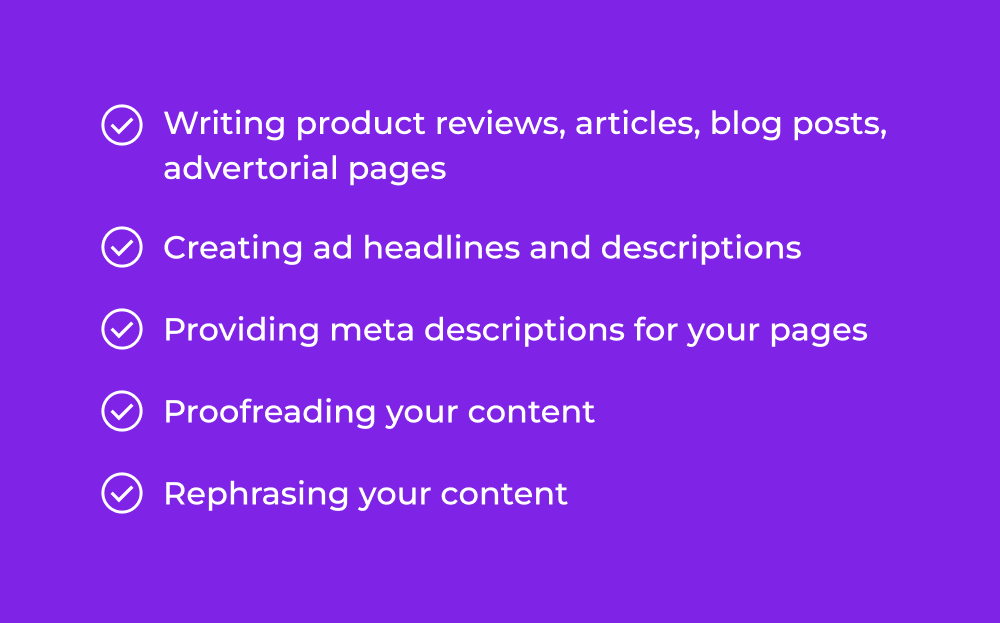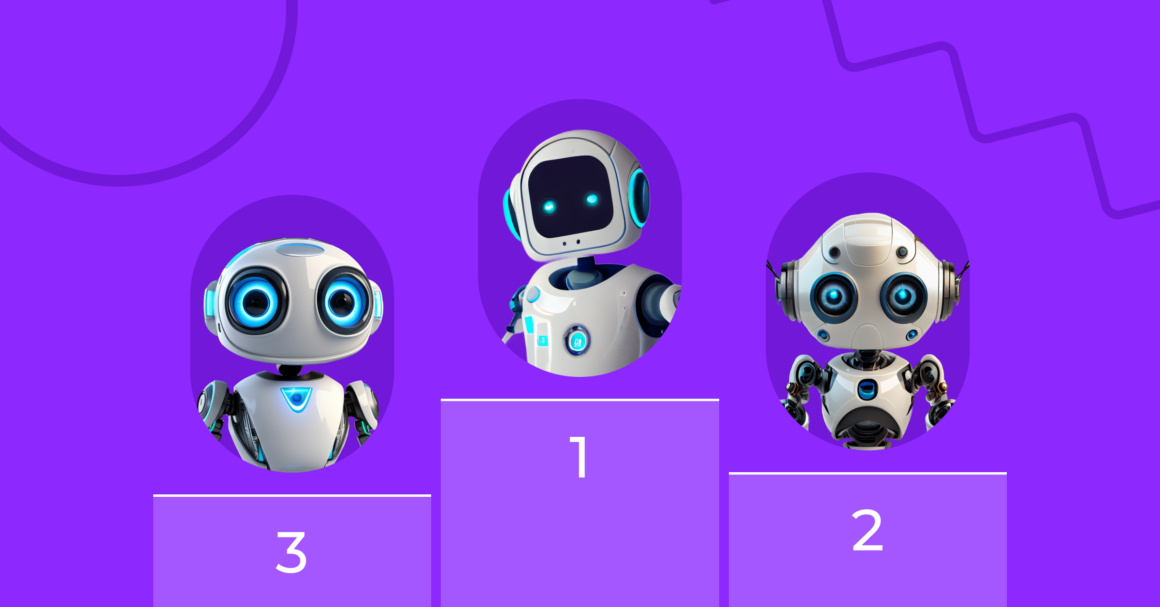Since its debut in 2022, ChatGPT has transformed the way content marketing operates. It has proven that good AI writing tools can offer great assistance to writers and optimize workflows for marketing executives.
But not all tools are equal, and the content they produce may not necessarily help you climb to the top of the SEO rankings. In some cases, it can do quite the opposite.
Luckily, you have this handy article that will guide you through the meanders of picking the best AI writing tool for you – and help you use it correctly.
What are AI Writing Tools?
AI writing tools use LLM (Large Language Models) that are trained on large data sets. Various tools use different LLMs, and they differ in many aspects, but for the end user, the only thing that matters is the content they produce.
AI writing tools may be general-purpose, built to provide a human-like conversational experience, or they may be specifically built to aid in marketing-related tasks. Depending on what you want to achieve, sometimes one type will do the job better than the other.
The technology behind these tools may feel like magic, but they are merely glorified statistical models that simply predict which word should come next. In the purest sense of the word, they are not creative; they repurpose what was already written.
This raises some obvious concerns about the originality of such content, which we will address later.
What Can You Use AI Writing Tools For?
Well, for writing, of course. But not only to write the whole blog post for you.
Let’s get something straight: these tools are not a one-button solution. You still need to provide a good prompt, check the results, polish it, redact, tell the AI engine to rework the content a bit, and so on.
Nevertheless, when used correctly, AI writing tools may help you with tasks such as:

AI writing tools can help with various types of ads, but they are especially good with content-heavy types such as native ads or social media ads. They usually require long forms and a variety of versions to be A/B tested and optimized.
Remember that you can A/B test your content on a massive scale with AI using Voluum ad tracker!
How to Produce Good Content with AI Writing Tools
Let’s circle back to the original concern of ranking on SEO pages with AI-produced content. How does Google approach it?
You can find the details in their guidelines, but the important takeaway is that if the content is useful, it doesn’t matter how it was produced. If Google detects that you generate content purely for SEO ranking, not for providing users with value, it will move your page down the rankings.
Many news outlets or portals are already using AI to create articles – most notably CNET. These articles are still thoroughly reviewed for errors by human editors though to make sure they are still trustworthy and informational – in short, that they still provide value.
So, to make sure you produce quality content with AI writing tools, follow these tips:
- Have an idea for a quality article, not for a filler article on the topic suggested by keyword research
- Do the research manually or with AI. Gather information, compare products, talk to people.
- Provide detailed prompts to AI. The more information you give regarding style, language, tone of voice, type of content, etc., the more accurate results it will produce
- Review the content for factual errors and AI hallucinations before publishing
If you follow these simple rules, Google won’t care how you have produced the content, as long as it treats it as valuable.
The Ranking of the Best AI Writing Tools for Marketers
Note that this ranking is subjective, and most tools on this list will do the majority of marketing-related tasks that you throw at them. Sometimes for free, sometimes for a price.
- JasperAI: Our top pick for the best AI marketing tool today. JasperAI offers comprehensive features that cover copywriting, content strategy, and integrated end-to-end marketing campaigns. Jasper is specifically built for marketers. With plenty of integrations with popular marketing platforms and web extensions, it offers great functionality. Because of its high price, it is recommended for agencies or marketing departments rather than solo marketers. Pros: Comprehensive features, suitable for all types of businesses. Cons: Expensive.
- Semrush: Content writing and planning platform. Semrush is a well-known name in the digital marketing industry. The addition of an automated writer makes it a compelling choice for all marketers. The platform combines analysis and writing into one seamless experience. Feature-rich platform already used by millions of marketers. AI writing assistant is just one of the myriads of Semrush features, not the platform’s main focus.
- WriteSonic: Overall best AI content writer for marketing, it can produce a variety of marketing content, paraphrase it, expand or summarize. On top of that, it offers additional AI-backed solutions, such as tech support bots or text-to-speech features. Pros: Offers a wide range of templates and options to choose from. Cons: Limited customization options.
- ChatGPT: The general-purpose AI that started it all. It hasn’t been built for marketers, nor does it have a suite of various features or integrations. What it offers for marketers is its creativity. While you have to provide well thought-out prompts to get the results you want, the overall versatility of the platform makes the effort worthwhile. Plus, there’s a free option that may be good enough for most marketers. Pros: General purpose, free to use Cons: No templates for marketing content, no integrations.
- Anyword: Data-driven AI content writer for optimizing copy. The platform is basically the antithesis of ChatGPT. While the latter could serve various use cases, Anyword is specifically tailored to your marketing needs. Pros: Offers a wide range of templates and options to choose from. Cons: Limited customization options.
- Reword: Ethical and fact-based AI content generator. Reword allows marketers to quickly draft informative and engaging content. With built-in research tools, it combats AI hallucinations and provides personalized editorial suggestions to take your writing to the next level. Pros: Cheap and versatile Cons: No built-in keyword or audience research
- Canva Magic Write: Best built-in AI writer for social media design. If your focus is strictly on social media or you want to create design-heavy pages and the content is more of an addition, Canva may be a great fit for you. Canva alone is a useful tool allowing users to create designs and presentations, and the Magic Write feature turns it into a fully-fledged marketing powerhouse. Pros: Offers a wide range of templates and options to choose from. Cons: Limited customization options.
- InkforAll: Best AI copywriter for search engine optimization (SEO). If you are serious about getting your page to the top of the SEO rankings, InkforAll is the tool for you. It combines real-time audience research with AI-assisted content writing. Do you really need more buzzwords to be persuaded? Pros: Offers a wide range of templates and options to choose from. Cons: Limited customization options.
- ClickUp: All-in-one marketing suite with AI writing assistant. ClickUp tries to replace many productivity platforms, such as whiteboards, task managers, and chats. If you sink into their ecosystem, the included AI generator will be a great addition, allowing you to quickly draft emails, messages, or posts. Pros: Free for personal use, cheap for business use Cons: Good only for short forms
- CopyAI: The best choice for all things marketing. CopyAI has a workflow for various marketing areas, including e-commerce, social media, or SEO. For each workflow, it can generate content that is focused toward your goal: getting to the top spot on Google, increasing sales, or others. Pros: Offers a wide range of templates and options to choose from. Cons: No ready-made integrations.
Increase Productivity with AI

AI is not at the stage where it can fully support your content marketing strategy without human supervision. Content writers are still needed not only for checking AI’s output but mainly to add the creative touch to sometimes dry and corporate content massively produced by AI.
Google’s algorithms can spot shallow content produced at scale to artificially increase attractiveness in the eyes of search engines and lower its score. Human oversight is a must for the foreseeable future.
This, plus a good round of testing AI-generated content against real people, are the foundations of the best content marketing campaigns.




